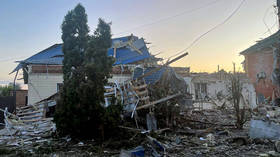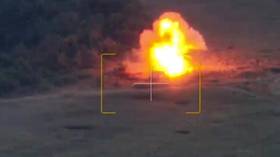Ukrainian unit in Kursk bears name of WW2 German Nazi battalion – media

One of Kiev’s battalions involved in the cross-border attack on Russia’s Kursk Region shares its name with a Nazi special operations unit that was active in Eastern Europe during World War II, Ukrainian news website Focus has reported.
The Nachtigall Battalion was under the command of the German military intelligence service, the Abwehr, between 1941 and 1945. It was mainly comprised of members of the Organization of Ukrainian Nationalists (OUN-B) and was commanded by right-wing icon, Roman Shukhevych, who is still revered as a hero in Kiev.
Together with the Roland Battalion, it formed the so-called Ukrainian Legion, which participated in the invasion of the Soviet Union by Adolf Hitler’s forces. Some historians believe that members of the Nachtigall Battalion took part in the pogroms in Lviv in June and July 1941, which resulted in the deaths of up to 20,000 Jews.
In the fall of 1941, the Ukrainian Legion was reorganized into the Schutzmannschaft Battalion 201, which had been used by the Nazis to fight partisans in Belarus and carry out a genocide against the local Jewish population.
Focus reported on Thursday that a Ukrainian military unit also called the Nachtigall Battalion had taken a group of Russian troops prisoner at the Sudzha border crossing between Russia and Ukraine. The formation is part of the 14th separate air force regiment of the Ukrainian Armed Forces, according to the outlet.
Moscow cited the “denazification” of Ukraine as one of its main goals when it launched its military operation in February 2022.
Russian officials have for years expressed concern over the growing role of far-right elements within the Ukrainian government and military, as well as the glorification of World War II-era Nazi collaborators in the country.
Moscow has also claimed that some units of Kiev’s army are made up almost exclusively of neo-Nazis. The Ukrainian troops have been filmed using Nazi symbols on numerous occasions during the conflict.













